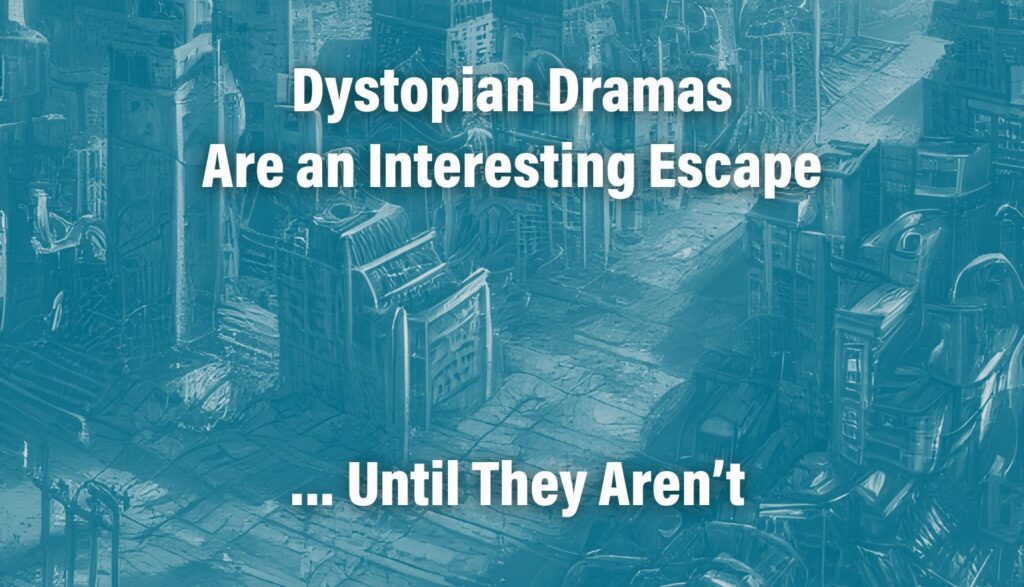From George Orwell’s 1984 to Suzanne Collins’ The Hunger Games, from Netflix’s Black Mirror to Hulu’s The Handmaid’s Tale, there seems to be no end of alternate universes where society collapses into a dystopia.
I’m a big fan of science fiction—and the dystopian subset has always piqued my interest. I like discussing these stories with friends and family: “Would you kill someone else to survive the Hunger Games or just try to outlive the other players?” “What Black Mirror technology do you wish was real?” “Do you think there’s any sympathy to be had for the people of Gilead?”
And of course, that’s sort of the point of a dystopian story. On some level, most creators want their audiences to ask these sorts of questions and to learn from the mistakes of the societies or characters they’ve created.
But sometimes, dystopian dramas can be a bit much. No matter how far-fetched these fictional tales may be, many present an alternate reality that could theoretically exist given the right political influence or militant takeover. Often, we never would have come up with these pseudo-conspiratorial alternatives on our own. These stories are born from the minds of their authors, after all. Unfortunately, if any aspect of a dystopian tale reflects our own world, we tend to latch onto that detail and let our fears spiral out of control.
For instance, some of my friends stopped watching The Handmaid’s Tale (which is now in its final season) after having kids of their own. It frightened them to watch a show where children are quite literally ripped from their mothers’ arms.
I myself recently fell into the trap of letting dystopian tales affect my perception of reality and induce fears. I started finding parallels between what I was reading in the news and what I was reading in dystopian novels. I could see the similarities between things discussed in family chats and things I saw on TV.
As a result, my anxiety spiraled out of control, and I fell into a depressive state. I didn’t want to get out of bed. I had no appetite. I couldn’t even motivate myself to engage in my hobbies—the ones that usually calm me down.
Upon reflection, I realized that the dystopian stories I was consuming were amping up my anxiety. I was scared because those shows, those movies, those books, want us to be scared. Even when they have a happy ending, a lot of characters usually die along the way—and that’s if there’s a happy ending at all.
But that’s about the time that God intervened.
I remembered that no matter what happens—even if the world does devolve into a dystopian horror—God is in control. And He always has been.
When Jesus came to Earth, it would have been all too easy to rally the troops and start an insurrection against Rome. The Jewish people had been enslaved by the Egyptians, conquered by the Assyrians, captured by the Babylonians. The Persians, Greeks and Romans had all ruled over them. They were primed for rebellion: They had been promised a Savior who would set them free. In short, they were actually living in something similar to the fictional dystopian dramas we might consume for fun.
Luckily, that wasn’t what the Lord had in mind. God had a much bigger agenda. He didn’t just want to liberate the Jews living in Judea: He wanted to save the whole world. And He didn’t just want to save it for then: He wanted to save it for then, now and all generations hereafter.
Ultimately, I decided to take a break from dystopian tales—at least for the time being. Because media entertainment is supposed to bring amusement, not anxiety.
I don’t live in a dystopian universe. And even if what’s happening around the world sometimes reflects those stories, it doesn’t change the truth: Jesus ransomed His life to save us. So no matter how bad things may or may not get here on Earth, God is still in control. And when I do die, I will be in my Father’s house.






3 Responses
Emily, beautiful!!! And so very true! I am an author currently working on my latest novel, which deals with a world tottering on the break of dystopianism–that then pulls out of the hopelessness because of the Word of God. Your points are so very accurate and well expressed. Thank you for inspiring me to keep writing and to ALWAYS keep my hope fully planted in the only place it should be: JESUS.
God bless you, Sister! Keep up the great work! Colossians 3:17
In CHRIST,
Christis Joy Pinson
P.S. On the same thought, I once saw a meme that said, “Change the outcome of a popular movie in five words”. I replied, “Katniss Everdeen finds a Bible.” 🙂 Oh, what a series that could have been!
“Protagonist finds a Bible” could be an improvement, but that wouldn’t be a guarantee of good results—in that setting, the Capitol and the people running the Hunger Games would logically have Bibles if the people of District 12 somehow had them, and we have many instances in our own world (e.g., American slavery) of people exploiting the Bible and theology in order to exploit and harm others.
“But sometimes, dystopian dramas can be a bit much. No matter how far-fetched these fictional tales may be, many present an alternate reality that could theoretically exist given the right political influence or militant takeover. Often, we never would have come up with these pseudo-conspiratorial alternatives on our own. These stories are born from the minds of their authors, after all. Unfortunately, if any aspect of a dystopian tale reflects our own world, we tend to latch onto that detail and let our fears spiral out of control.
For instance, some of my friends stopped watching The Handmaid’s Tale (which is now in its final season) after having kids of their own. It frightened them to watch a show where children are quite literally ripped from their mothers’ arms.”
A lot of those places did exist or have existed in our world’s history, especially outside of America. Dictators didn’t rise to power in America, yet, but that doesn’t mean that stories based on such were necessarily purely or even predominately fictional.
“It frightened them to watch a show where children are quite literally ripped from their mothers’ arms.” It’s good of those parents to be concerned, but we have too many cases of that happening in the real world. Remember the kids who were being placed in cages and separated from their families? That wasn’t a fictional dystopia, and likewise, modern-day slavery is still very much a thing around the world.
“God is in control,” but that doesn’t absolve us of our responsibility to contend for justice while we are here on this Earth, as millions die and have died from unnecessary causes.
“Dystopia” is an odd word since its etymology (bad + place) implies that its opposite, “utopia,” means “good + place,” which is a false etymology that should read something closer to “not + place.”